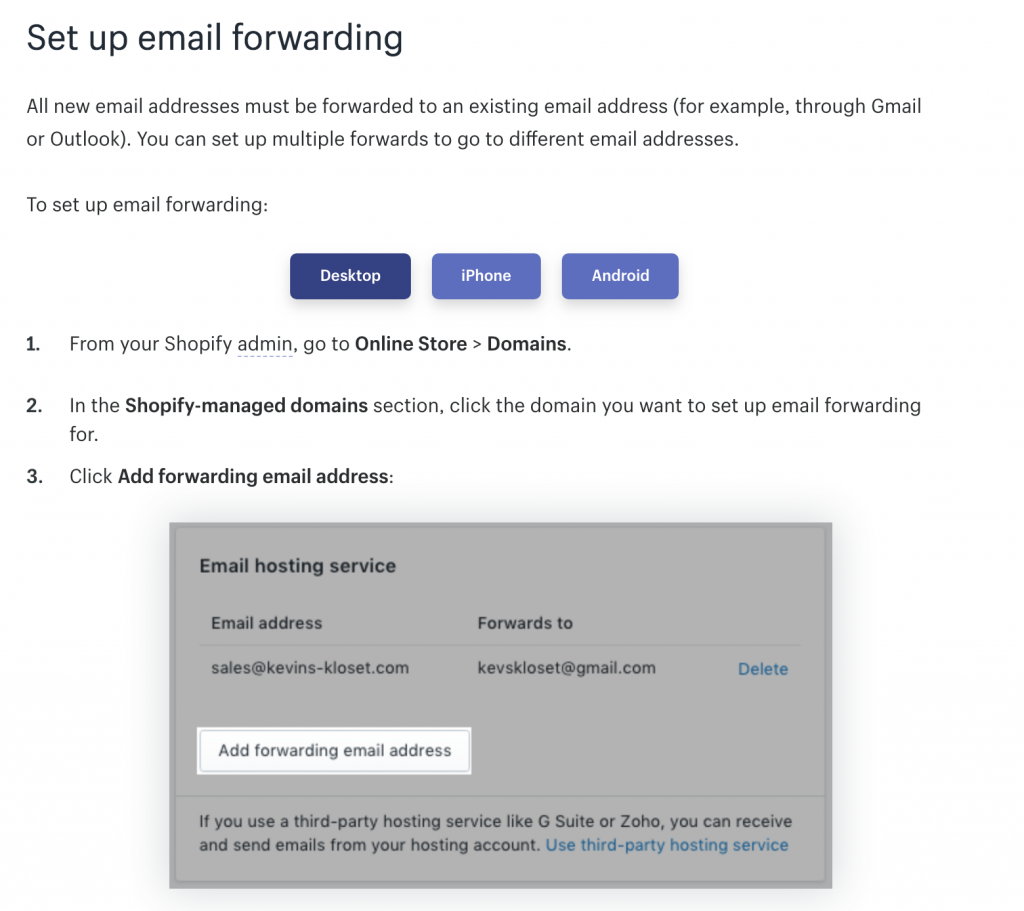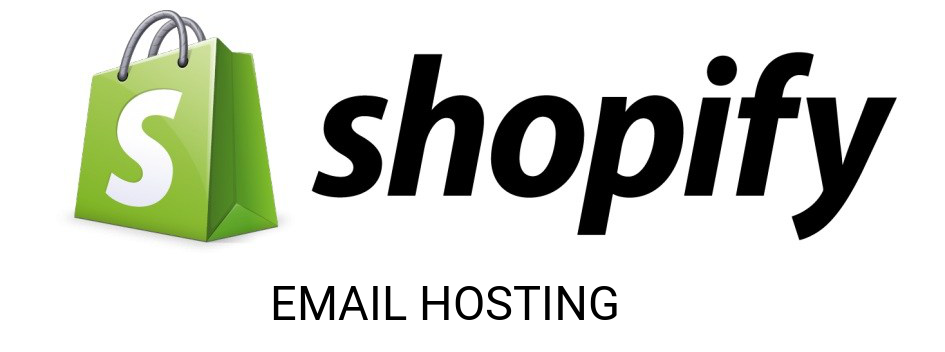Confused about Shopify hosting & Shopify email hosting? Many people are. Shopify is one of the most popular e-commerce platforms available today. Many businesses are wondering whether Shopify hosting services are part of the deal when you sign up and what this actually means. This detailed guide will provide all the information about Shopify hosting and Shopify email hosting requirements and options available to your new store.
Do You Need Hosting for Shopify?
If you’re new to Shopify and want to try it out, you will be pleased to know that you won’t have to look for a website hosting service. Shopify provides their very own web hosting, and every Shopify hosting plan has unlimited bandwidth too, which is one of the many reasons for their overwhelming success and popularity.
In addition to having Shopify web hosting included in every plan, they were the first online hosting solution to offer a content delivery network (CDN). Today, their CDN is powered by Fastly, which is one of the best CDN companies out there, so hosting isn’t an issue if you decide to use Shopify.
Try Shopped Email NowHowever, what Shopify do not offer is Shopify email hosting, they only offer email forwarding. This is where people get confused. Because email hosting and web hosting are different things. And email forwarding (what Shopify offer) – is not what many people expect it to be.
Email forwarding is rather straightforward: with this service, you can direct emails from your custom domain (if it was registered with Shopify) to your existing email account—either to Gmail, Yahoo, Outlook etc. However, this only re-directs the incoming emails to your preferred inbox, and if you send any replies (like errr…any normal person would), your customers will be able to see that the emails were forwarded on from a different email. For example:
A customer sends you an email to info@storename.com, which forwards to your Gmail account: iluvmileycyrus@gmail.com or whatever your email is. When you reply to your customer, the sender information will say from: iluvmileycyrus@gmail.com
While this may seem like a suitable workaround for some startups, if you want to run a successful store, you need a custom email address which your customers will see. Email forwarding comes across as unprofessional so it’s best to avoid it.

When it comes to Shopify email hosting, you can choose from a number of email hosts including Zoho mail, Gmail and Outlook. But, a very popular option is using our email hosting (Shopped Email) which is currently the only dedicated Shopify email hosting service in the world.
Do You Need Email Hosting for Shopify?
Yes. Professional, successful Shopify stores all use separate email hosting and pay for it as Shopify doesn’t offer a dedicated email hosting service. You’ll need to get your own email hosting from a third-party and while there are many options out there, but we are the only one offering dedicated Shopify email hosting. We cater specifically for Shopify and work with the platform on a day to day basis.
Try Shopped Email NowWhat are the problems with Shopify email forwarding?
There are a number of problems with Shopify’s email forwarding service:
- It’s not professional to send mail from a gmail/yahoo account – your customers should not get emails from an unbranded domain
- You can only use forwarding in you have registered your email with Shopify (& not through a 3rd party).
- Mail is often lost in forwarding chains – usually because of spam filters.
For these reasons most people choose to use Shopify email hosting via a third party.
Shopify MX Records
When setting up your email hosting services, one thing that is required are MX records. These are DNS records required for successful delivery of emails to your address and they hold information about which server on a domain accepts incoming email, as well as routing information for incoming emails.
Changing DNS records can be complicated for some sites. Especially if you’ve not made these kinds of changes before.
Many people who don’t know the Shopify platform tend to look for the Shopify MX records only to come up empty-handed, which isn’t surprising as Shopify doesn’t offer email hosting, so finding their Shopify MX records is not possible. Instead, you’ll only be able to get an MX record for a third-party email hosting service which you can then send mail to. Shopify email hosting is only offered by third-party email services like:
- Shopped Email – we are the only dedicated Shopify email hosting in the world
- Zoho Mail – as part of the Zoho suite
- Gmail/G Suite email hosting
- Outlook email hosting
What you can find, however, are the Shopify MX records for Shopify’s email forwarding feature which looks something like this: mx.yourdomain.com.cust.b.hostedemail.com
But, this won’t let you send any emails from your domain, as the main purpose is only to forward.
Each email hosting service will have their own MX record, for example, Shopped Email have an MX record similar to Shopify’s MX record that looks like this: mx.yourdomain.com.cust.hostedmail.com
Because they are this similar, it makes switching much easier, but always make sure to double-check whether your MX record is correct. In case it’s not, you won’t receive any emails.
Shopify Free Email Hosting
Many shop owners, upon learning that email hosting isn’t offered by Shopify, try their luck by searching for “free email hosting for Shopify.” This is because they often find the email forwarding option isn’t a good fit for them as it doesn’t come across as very professional. This means you should only be using the email forwarding as a quick fix while you set up your custom email address if you want a professional and successful Shopify store.
Nobody offers free email hosting on your custom domain anymore, and if they do, it’s highly likely that they’re using your data in ways you don’t want them to. There is no workaround when it comes to Shopify Email Hosting as you either find a paid option, or you don’t use it at all. In order to be considered a professional shop, however, you don’t have a lot of alternatives but to use a hosting service that you will have to pay for in addition to your Shopify services.
Shopped Email – Shopify Email Hosting
Shopped Email is the only dedicated email hosting for Shopify in the world. It’s easy to use and hassle-free, and they will even assist you with changing your DNS records to access your emails easily.
Zoho Mail/Email (Office Suite) Hosting for Shopify
Zoho mail is a popular email option among many professionals, with up to 1TB of storage, as well as POP and IMAP access, and no advertising anywhere. It offers free and paid options, and for a very low fee, you can have a professional email that you can easily use and connect with your Shopify store as a great Shopify email hosting option.
G Suite Email Hosting for Shopify
G Suite is Google’s suite containing everything an emerging (and even established) business will need: from email and communications, all the way to cloud storage, collaboration software and the usual Google services like; Gmail, Docs, Drive, and more. G Suite is another popular third-party option when it comes to Shopify email hosting, as it lets you set up professional-looking email addresses for your business and easily connect them with your store.
Gmail Email Hosting for Shopify
Gmail is the most popular email service out there, and is easily set up and available to anyone, whether you want a personal or business account. It’s available as part of the G Suite or as a standalone service that can work well for Shopify email hosting, but only if you use the “Gmail for Work” version that supports creation of custom domain email addresses.
Outlook Email Hosting for Shopify
Outlook is the go-to option for many business professionals, and once you get used to it, it’s really hard to switch to something else. It’s mostly used for emails, although it’s actually a personal information manager containing a calendar, task and contact manager, journal, and notes as well. It is also often integrated as an email hosting option for Shopify.
Shopify Email Spoofing
Email spoofing is where a malicious source sends an email and pretends to be another company, with the aim of acquiring your personal information. This type of attack happens quite regularly and a quick glance at your private email spam folder will reveal such email examples to varying degrees of cleverness. If you check “Shopify email spoofing,” you will see that there have indeed been several instances of spoofed emails that pretended they were sent from Shopify.
When you receive an email from Shopify, or anyone else for that matter, you should first check the sender. In Gmail, for instance, you just have to hover over the sender name to get more information about it—it will show you the display name, but also the email address it was sent from. In many instances you’ll notice a strange or even personal email address that becomes immediately obvious that it wasn’t sent from Shopify. In other cases, it could contain the name “Shopify” along with another name or set of numbers which is another indicator it’s a spoof email.
Although many mail hosting services easily filter out such email, it’s best to stay vigilant and check every sender thoroughly before opening the email and clicking any links that you might find inside.
If you suspect that you might have been a victim of Shopify email spoofing, or are targeted frequently by such attempts, you should contact Shopify support, especially if there’s a chance that you have provided your store’s password to them.
To maintain constant security, make sure you regularly change your store passwords to hinder those attempting to steal your data.
Ready to start sending emails from your own domain? Try shopped email today – the world’s only dedicated email host for Shopify.
Sign Up Now




